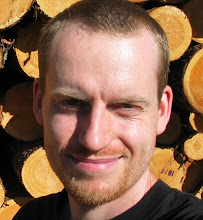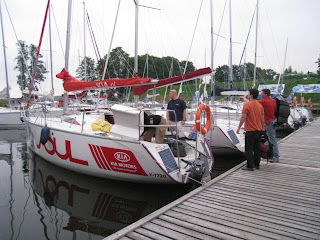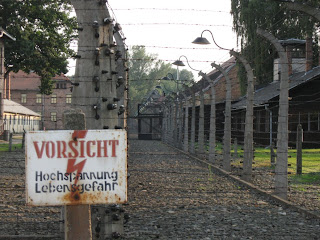I left Bratislava in mid May and spent the following few days in the Mala Fatra National Park, exercising my legs walking from mountain hut to mountain hut, enjoying great views and the fresh air on desolated trails (because it was still early in the season). The huts are perfect for long distance hiking; they offer very affordable accommodation starting at around 5Euro if you bring your own sleeping bag and serve up superb food.

...following a ridge trail through the Mala Fatras...

...and enjoying a delicious cabbage soup in a mountain hut at the end of the day. It has become my favourite soup so far and I sample it where ever I get a chance, though it has never been quite as tasty as in that Mala Fatra mountain hut.
Later I moved on to Zdiar, a small Slovak village in the Tatra mountains. I was attracted to the Tatras because they climb up to about 2600m and promised some alpine hiking experiences. When I arrived at the Ginger Monkey Hostel in Zdiar, I thought I'll stay for about one week and do a couple of hikes before heading south into Hungary. However, Jim, the owner of the hostel also had some plans... After some chatting with him I found myself with the offer to run the hostel for couple of days so that he could go off to pursue another project. I was sitting on the hostel's sun deck with a bottle of beer in my hand, thought about it for 15 minutes and then took up his offer. I thought that working at this hostel would leave me with plenty of spare time to finally get on with some reading that I had been meaning to do ever since I started traveling and also catch up with replying to emails. I moved from the dorm into a private room, did a nice hike that involved crossing through many steep snowfields and spent the rest of the weekend relaxing and then started work on Monday. Towards the end of the next week I noticed that I had sort of developed a routine in cleaning the place, doing the laundry, showing guests around etc, so I decided to work for another week and use that newly developed efficiency to really get on with some reading. Besides, I also realised that hostel work was a good way to prolong and intensify my travel experiences. I had a free accommodation, free beer, a couple of days off per week to pursue my own interests and I was located right at the edge of the High Tatras with an awesome view of the still snow-clad mountain summits.

Contemplating about starting hostel work

Spending some quality time on the Ginger Monkey's sun deck...

...and enjoying the mountain view.
After about five weeks of staying at the Ginger Monkey it felt like I had been stationary for long enough and it was time to start traveling again. I did more in the area than any regular guest, including a superb hike along the Tatra border ridge between Poland and Slovakia, some canoeing and I soaked in hot water for a whole day in a nearby water spa centre. However, I didn't manage to finish either of my books and that despite the fact that there was probably only 3-5h of work on an average day. The problem is that the work is distributed quite randomly over the day, like checking people in and out, getting the laundry in when it starts raining, helping guests with planing their day activities... so unless there are two people to share the work between, you are kind of always on call which is less than ideal when it comes to reading something. Another interesting experience was that you have to learn to relax when working at a hostel. An example: You clean the kitchen, do the dishes, dry everything up and put it away, sweep the floor and all that and then, five minutes later, someone decides to bake a cake for everyone to share. Yummy, I love cake - and the kitchen is back in a mess in no time. Most people do make an effort and clean up after themselves, but there is always something that gets left behind, and that will encourage other guests to be that little bit more sloppy as well. So you can try to talk to your guests about it but depending on your verbal skills that might create an atmosphere where people think they are being watched all the time, you can keep cleaning, every minute of every hour, because if you look hard enough you will always find something that needs cleaning, or you set yourself some priorities that result in a reasonable level of cleanliness and still have some energy left to enjoy that piece of cake that someone just made for you. Being a perfectionist that was a tough one to get to terms with!

Even in the summer season there is still a lot of snow to conquer in the mountains

Skywalk on Lomnicky Stit at about 2600m. It was bloody freezing up there - always bring a spare jumper when visiting the High Tatras!

Entertaining our guest with BBQ's
The most valuable “thing” I am taking with me from my six weeks stay at the Ginger Monkey hostel are a few conversations with some of the guests. I met so many people there that you don't have a choice but keep conversations to a superficial but friendly level with most people. And that is OK, it happens automatically and is probably some kind of self-protection mechanism. But then, every once in a while you meet someone very charismatic, or well-traveled or just someone who you get on with extremely well and you make a connection. I will not forget Chuck's analysis of why Germans, of all people, picked up the Stanford Prison Experiment that he participated in, and made a movie about it (Das Experiment) exploring how a system makes generally good people turn into bad people. Another highly interesting encounter was that with Matt and Jai who have travelled extensively. Well, to be fair, they actually live for it. They have had so many adventures, and many of them were the result of giving away control, like what you do when you hitch hike and allow chance creep into your daily routine and at the same time you get so much closer to the locals of a country. Ever since meeting them I wonder how I want to continue my trip...

One of the many communal meals at the hostel - nice group effort, guys!

Exchanging experiences and ideas and planning the next move...
Well, for now I am looking forward to do some sailing. I left the Ginger Monkey and the Tatras on June 24 to meet up with some friends to go to the Great Masurian Lake District in North-east Poland and spend a week there living on a small sailing boat. After that week I will continue with my backpacking trip.
 Overlooking snow-covered Râşnov from the fortress. Our day time temperatures this week were around -10, and one night it even plummeted below -30 degrees.
Overlooking snow-covered Râşnov from the fortress. Our day time temperatures this week were around -10, and one night it even plummeted below -30 degrees.












































